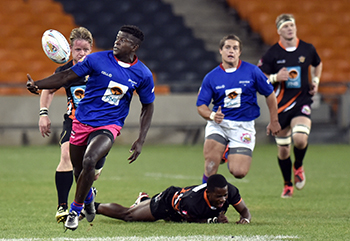Latest News Archive
Please select Category, Year, and then Month to display items
14 June 2024
|
Story Anthony Mthembu
|
Photo Suplied
 Jeremiah Hlahla, a UFS student completing his PhD in Botany at the University of Debrecen as part of an exchange initiative funded by the Erasmus+ Mobility Programme.
Jeremiah Hlahla, a UFS student completing his PhD in Botany at the University of Debrecen as part of an exchange initiative funded by the Erasmus+ Mobility Programme.
As part of an exchange initiative facilitated by the Erasmus+ Mobility Programme, Jeremiah Hlahla, a student at the University of the Free State (UFS), is nearing the completion of his PhD studies at the University of Debrecen in Hungary. Hlahla’s journey, which began in February 2024 and is set to conclude in July 2024, has been a remarkable learning opportunity. “As a first time-traveller to Europe, I have thoroughly enjoyed engaging with people from different countries and cultures,” he said.
The benefits of international collaboration
Hlahla is currently pursuing a PhD in Botany, focusing on plant stress physiology. “My current PhD project investigates the physiological, biochemical and morphological responses of vegetable-type soybean, or edamame, to combined drought and heat stress,’’ he explained. He considers the University of Debrecen the ideal institution to complete his research due to its extensive expertise and resources in similar projects. He noted that his colleagues at Debrecen conduct significant work on plant protection against biotic and abiotic stresses, including salt and drought stress, as well as proteins and amino acids in barley and other legumes.
Given the vast knowledge available on similar projects, Hlahla has found substantial engagement with his work at the University of Debrecen. “Upon arrival, I delivered an introductory lecture presenting my UFS project on the synergistic effects of combined drought and heat stress on the physiology and biochemistry of edamame. It was an engaging session as everyone could relate to my work and asked many questions,’’ he said.
Insights gained from the exchange
Hlahla has also gained valuable lessons that will assist him in his research career, including biotechnology and physiology tools. “I learned how to prepare samples and use high-performance liquid chromatography (HPLC) and reversed-phase ultra-high-performance liquid chromatography (UHPLC) to quantify proteins and amino acids,’’ he said. These techniques are beneficial not only for his current work but will also support future soybean research.
As his experience at the University of Debrecen nears its end, Hlahla reflects on the collaborations and friendships he has formed, which stand out as a significant highlight.
Mafuma aims at elusive tournament victory with Junior Springboks
2016-06-03

The University of the Free State’s Mosolwa Mafuma
recently scored five tries in the Junior Springboks’
three practice matches against a Golden Lions U20
invitation team, a Maties team, and the
South Western Districts. Photo: SASPA
He has never won a rugby tournament, so Mosolwa Mafuma has only one goal: to win the Junior World Cup as Junior Springbok in England.
Even though the 20-year-old Shimlas wing has achieved success, and it is pleasing to excel individually, he believes it is more satisfying when his team triumphs. According to Mafuma, who could just as well be an athletics star, he wants to help the South African U20 team take a different approach.
He and the prop Kwenzo Blose are players from the University of the Free State who will represent the Junior Springboks from 7 to 25 June 2016 in Manchester. The team will play the first of three group matches on 7 June 2016 against Japan in the Academy Stadium.
New approach for SA U20 team
Mafuma, who was Player of the Tournament in his first Varsity Cup in 2016, says the Junior Springboks are well prepared. “We have the skills, and the structures at the Junior Springboks are different than before. There is not just one game plan like playing with big guys. We want to try new things and have a different approach.”
It is with this team that he wishes to achieve something. “It is one thing to be able to say that you are the Player of a Tournament, but your team did not win. I have not won something at school (with St. Benedict’s Boys College in Johannesburg) or this year with the Shimlas.”
Speedster on athletics track
The speedster is one of only a few rugby players who also have a profile on the IAAF website. His fastest time in the 100 m is 10.37 seconds (a national U17 record) and 20.37 s in the 200 m.
In high school, this first-year Psychology student played rugby during winter and took part in athletics during summer. Only at the end of Grade 11 did he started focusing on rugby. “I was more of an athlete than a rugby player,” he says.
It is no coincidence that the nickname he acquired due to his speed, is Dash. His other nickname, Senkie (derived from the Afrikaans word ‘seuntjie’) he received as a child from his parents because he was such a small child.